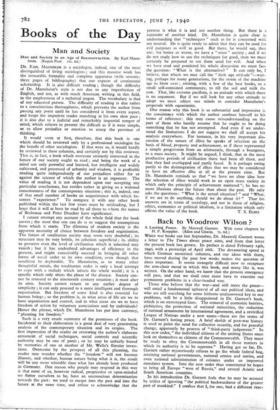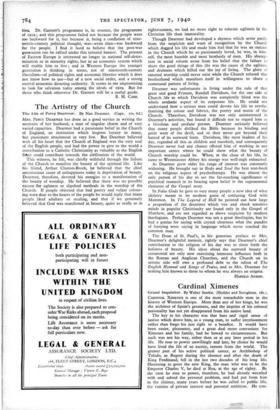Back to Woodrow Wilson ?
A Lasting Peace. By Maxwell Garnett. With some chapters by H. F. Koeppler. (Allen and Unwin. 7s. 6d.) WHEN war broke out last September, Dr. Maxwell Garnett wrote a letter to The Times about peace aims, and from that letter the present book has grown. Its preface is dated February 14th, 1940, with a postscript of April 16th. The devastating speed at which German motorised coltimns, and our ideas with than, have moved during the past few weeks makes the question of dates important. It seems strangely difficult now to recapture the arm-chair mood in which this book, and many like it, was written. On the other hand, we know that the present emergency will pass, and that we shall once more have to examine our permanent problems in a clear-headed way.
Those who believe that the war—and still more the peace— will entail a fundamental upheaval of all our political ideas, and who are still searching for some hitherto undiscovered key to our problems, will be a little disappointed in Dr. Gametes book, which is on stereotyped lines. The removal of economic barriers, plebiscites, the protection of national minorities, the reduction of national armaments by international agreement, and a revivified League of Nations under a new name—these are the terms of Dr. Gametes lasting peace. A brief skeith of post-war history is used to point the need for collective security, and for peaceful change, apparently by process of " third-party judgement." In this new order, "the individual citizens of the uniting States must look on themselves as citizens of the Commonwealth. They must be ready to obey the Commonwealth in all those matters in which its authority is to be supreme." Having got so far, Dr. Garnett rather mysteriously refuses to go the whole federal hog, retaining national governments, national armies and navies, and even national administration of colonies under an improved mandates system. Into the new order thus constituted he hopes to bring all Europe "west of Russia," and several Asiatic and South American countries.
In his introduction Dr. Garnett feels that he may be accused by critics of ignoring " the political backwardness of the greater part of mankind." I confess that I, for one, had a different reac- don, Dr. Garnett's programme is, in essence, the programme of 1919 ; and this programme failed not because the people were too backward for it, but because it, being a conflation of nine- teenth-century political thought, was—even then—too backward for the people. I find it hard to believe that the post-war generation can be rallied under this tattered banner. The peasant of Eastern Europe is interested no longer in national self-deter- mination or in minority rights, but in an economic system which will enable him to live ; and in Western Europe the younger generation is thinking in terms, not of nineteenth-century liberalism—of political rights and economic liberties which it does not know how to use—but of a new social order, and a strong central economic directing authority. It seems to me unpromising to look for salvation today among the ideals of 1919. But for those who think otherwise Dr. Garnett will be a useful guide.
E. H. CARR.



































 Previous page
Previous page